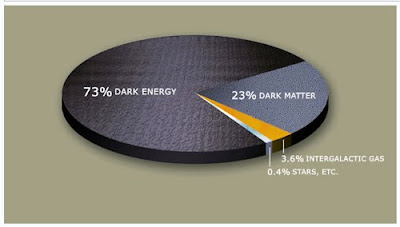Most of our Universe is Missing is another episode in the long lasting series BBC Horizon. This episode is narrated by Academy Award nominated actor Sir Ian Holm.
I will give a brief intro about what this episode deals with.
Do you know that around 96% of our universe is missing? And I'm not talking about the vast emptiness that we see. All the galaxies with stars, planets & other debris that you see has a total mass of only 4% of our universe.
Prior to 1970, everything in our universe is accounted for. Or that is what most people thought. But in the 1970s Prof. James Peebles & Prof. Jeremiah Ostriker, who were working on the stability of the galaxies & universe, found that with the notions of total mass existed at that time, the stability of the galaxies is difficult to achieve. They were thinking of some missing matter that is unknown to us & they came to know that forty years earlier Prof. Fritz Zwicky had the same ideas about missing matter. Thus our Dark Matter was discovered in theory. But the problem for others to accept this is that neither dark matter could be seen nor it was discovered practically. So, many of the others dismissed it as speculative.
The key breakthrough was given by Dr. Vera Rubin. At that time when most of the cosmologists are working on blackholes, she was working on the rotational curves of galaxies especially the outer parts of galaxies. You see, generally the farther a body is from a heavy object, the weaker the gravity & the lesser the speed. For e.g., in our solar system, Sun exerts more gravity on Mars than Pluto. The greater the gravity, the more the speed of the rotating body. So the speed of Mercury is larger than Pluto. If Pluto has a speed of Mercury, it will escape Sun's gravity. By the same principle, the stars at the end of the galaxy should have very slower speeds compared to stars at the center of the gravity. But Vera Rubin found that the stars at the end of the galaxy have almost the same speed as other stars (below pic). So something else was helping them & this was a massive shot in the arm for dark matter. In fact it is established now that not only the stars but Hydrogen clouds at the end of galaxy are also travelling at the same speeds.
So why is it difficult to find dark matter. The reason is that although it has mass, it is not made up of atoms. In a simple line, it is everywhere but can't be seen (atleast until now). Many scientists are trying to find a particle called as neutralino which might be the dark matter. In fact there is a group led by Prof. Tim Sumner who have been working for the past 16 years to find this. Hope they will soon crack this.
The episode also shows some of the view points of the doubters of the dark matter theory. A key person among the sceptics is Prof. Mordehai Milgrom. I've included his screenshot below because I love people who question authority. You would be bewildered if I say what he is questioning. He is actually questioning Newton's gravity laws for very very heavy objects such as galaxies. The beauty of science is that you may face opposition from your community if you are a rebel & contradict the existing rules but you are never stoned to death nor you are scorned upon. (I remembered a small incident happened to Prof. Dawkins which I will post at the end of this article). Prof. Mordehai Milgrom has his sound logic too for his arguments.
A few years back it was discovered that our universe is continously expanding & this requires enormous amounts of energy which is now called as Dark Energy. So we now have a cosmology standard model (pic below) which is being accepted by a vast majority of cosmologists & scientists.
The only part that I disliked in the episode is when they showed that segment related to the computer simulation & the minor debate around the effectiveness of it. That runs for around 6-8 minutes. If they have cut that & instead showed something regarding the current experiments & research being done for dark matter & dark energy, it would have been great.
Coming to the incident which happened to Prof. Dawkins, once when Dawkins was a biology student, his professor has been working upon a research for almost 15 years. But his research was not coming to any conclusions. Then another professor from another place visited his University & gave a seminar on the same research which he himself has successfully completed. Dawkins' professor's research for the past 15 years has all been wrong. Imagine what you will do when you know that 15 years of your life's work was for nothing. 15 years, people, is an enormous time in a person's life. But Dawkins' professor stood up, went to the other professor & said with tears in his eyes "I'm so proud & glad that you did this & proved me wrong." I've heard this a long time back. So please excuse me if any minor discrepancies have crept above.
I couldn't resist this screenshot. I hope some day, I will visit this place.
Love to hear your thoughts,







Be the first to comment!
Post a Comment